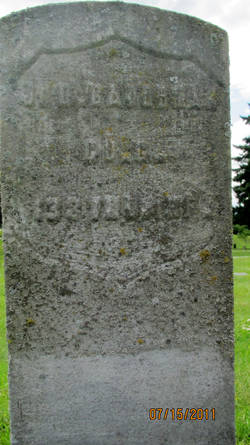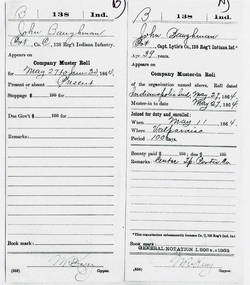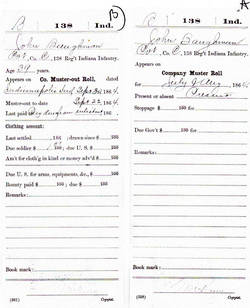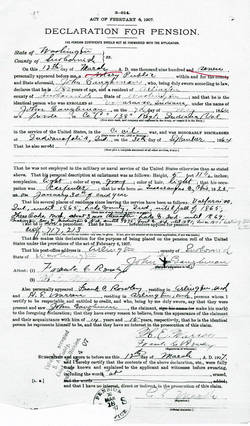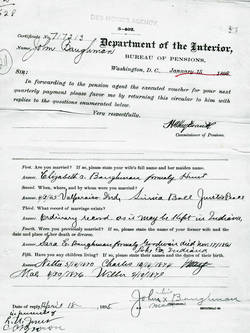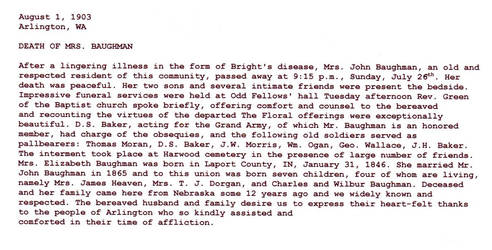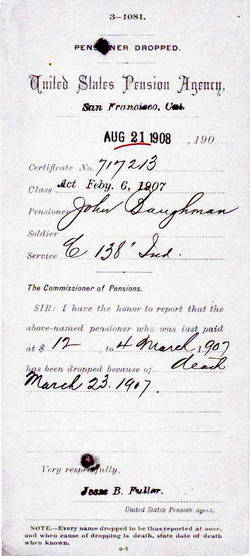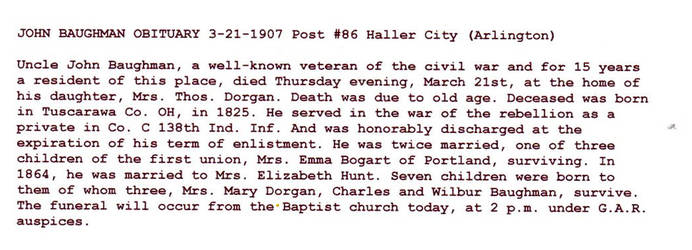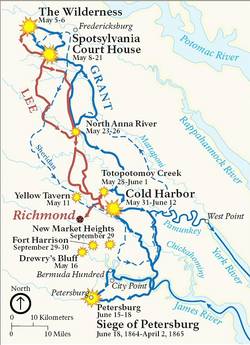John Baughman
Representing: Union
G.A.R Post
- E. M. Stanton Post #86 Arlington (Haller City), Snohomish Co. WA
Unit History
- 138th Indiana Infantry C
Full Unit History
138th INDIANA VOLUNTEER INFANTRY
Organized: May, 1864 Indianapolis, IN
Mustered In: Inf. 5/27/64 Indianapolis, IN
Mustered Out: 9/22/64 Indianapolis, IN
Regimental History
REGIMENTAL HISTORY:
During the spring of 1864 as Union General U.S. Grant began to move The Army Of The Potomac southward into Virginia for the Overland Campaign which would ultimately bring an end to five bloody years of American civil war, "seasoned' troops were pulled from rear echelon - garrison, etc. - duties and placed into the field army. To fill the void this re-deployment created states were called upon to create short-term regiments to take over these, primarily, non-combat duties. Indiana's quota of these "100 days" regiments was eight which were numbered consecutively from the 132nd to the 139th.
As a western theater unit the role of the 138th, as most other similar units, the 138th would be utilized for guard and garrison duty as well as any other tasks which might be required of them. Immediately following Federal muster the regiment departed Indiana for Tennessee. Upon reaching Nashville they were assigned to railroad guard duty along the lines of the Nashville & Chattanooga, Tennessee & Alabama, and Memphis & Charleston railroads. They were kept constantly engaged in that work until the latter part of August, 1864 - beyond the time for which they had enlisted - keeping Union Gen. W.T. Sherman's lines of communication open for the transportation of supplies to his army as he moved eastward.
Regimental losses: Officers killed or mortally wounded = 0; Officers died of disease, accidents, etc. = 0; Enlisted men killed or mortally wounded = 0; Enlisted men died of disease, accidents, etc. = 8; Enlisted men deserted = 1.
Soldier History
SOLDIER:
Residence: Porter Co., IN Age:
Enlisted/Enrolled: 5/27/64 Rank: Pvt.
Mustered In: 5/27/64
Mustered Out: 9/30/64 Indianapolis, IN
Discharged:
Highest Rank: Pvt.
Family History
PERSONAL/FAMILY HISTORY:
John F. Baughman was apparently the first child born to the union of Jacob (b. 1799 PA) and Sarah (No nee. b. 1799 PA) Baughman. His father's occupation was carpentry.
John's date of birth was 1/30/25. His place of birth was near New Philadelphia in Tuscarawas County, Ohio. He would later be joined by at least four known younger siblings: Samuel (b. 1827 OH), Jacob (b. 1830 OH), Catharine (b.1832 OH) and Jay (b. 1841 OH).
Circa 1847 the Baughman family removed from Ohio to Valparaiso, Porter County, Indiana, a community located in the upper northeast corner of the state near Chicago, IL and Lake Michigan. By this time it appears John was following in his father's occupational footsteps as a carpenter.
The U.S. Census for 1850 found the Baughman clan in the location noted above. Also in the home besides Jacob, his wife and children were Daniel (b. 1823 OH) and Uriah (b. 1848 OH) Fry. The connection between the Baughman’s and the Fry’s is not known. Also under Jacob's roof was Sarah E. (nee Goodwin b.1832/'33 NY) Baughman. Sarah was John's new bride, the couple having wed that census year.
In 1851 John and Sarah's first child, daughter Mary Emma was born. The following year, 1852 John and his young family moved from his parents' home to one of their own located about 30 miles south of the community of West Creek(township) located in Lake County, IN. It was there, in the year 1854, John and Sarah's second child, son Frank was born. John continued to ply his carpentry skills.
The census tally for 1860 found the John Baughman’s continuing to reside in West Creek. Interestingly, also in the home is one Emma Baughman (b. 1836 IN). Obviously a relative of John's her exact relationship to him is not known.
1861. A year of change and tragedy for the John Baughman family. The change came from an apparent move from West Creek in Lake County to Luke County. The tragedy came at that latter location when, on November 17th Sarah died. The cause of her passing is not noted in available documents.
Following the death of his wife John left his children with a member of his late wife's family identified only as Mrs. Goodwin. Perhaps this was her mother. He then moved back to Valparaiso, IN. Based on available documentation, it would appear that he never returned to the Goodwin’s to reclaim custody of his young ones.
From Valparaiso, in 1862, John travelled to Chicago, IL in order to join up with a military organization he identified only as the "Burnside Marines". Although not specifically identified, likely this organization was the 1st Regiment New York marine artillery. Here is that story as told by John. "I intended to do as a soldier in the navy. (From Chicago we travelled to New York by train and were enlisted.) There were about 400 of us in all. After remaining in New York about four weeks there were about five or six of us sent back and I was one of that number. I don't know why....I was not examined and rejected. (However) I think I was sent back because I wrote letters and gave the thing away." What the "thing" was is not explained.
Following his return from New York John said he lived part of the time in Valparaiso and part of the time in Lake County, Indiana. During this period he did "some work" for a Dr. Wood before enlisting in the army.
John's real shot at being a soldier came on May 11, 1864 in Valparaiso when he enlisted in Captain Lytle's (?) company of the then-being-formed 138th Indiana Infantry. This organization subsequently became company "C" of the 138th. (Note: John's late wife’s brother Horace A. Goodwin was a lieutenant in the same unit, but in company "D".) At enlistment/muster Private Baughman's vital statistics were noted as follows: Height 5'11"; Complexion light; Eyes grey and Hair light. His occupation was noted as "carpenter." At 39 years of age he was far older than the Civil War soldier's average age which was around 27 years. He was reportedly in good health despite having a "little cold" and, a few days before having had what was called "sore eyes." According to John, "Everybody had them at the time (and) were not treated by any doctor."
Private Baughman's eye problems - which might be considered the signature event of his time of soldiering - would become worse as he later explained. "During the latter part of August while in Deckand, Tennessee I had severe chills. When I got over them my eyes felt bad. That was the first time I noticed that. I went to the (regimental) surgeon twice to get medicine for the ague and my eyes. They didn't feel right. They were inflamed, but I don't think I was excused from duty. Then, in a short time they felt better, so I don't recall but little about them until I got back to Indianapolis." Back in Indianapolis Private Baughman was mustered out of the service on September 30th, 1864. Due him at the time was a dollar amount of $1.57 and "pay from enlistment." No mention is made regarding an enlistment "bounty" or bonus a portion of which he likely received upon enlistment.
John describes his life situation following his return to civilian life as follows: "After discharge I went to Valparaiso, Indiana and lived there about five months. (During that period) I was sick for about two months. Dr. Newlands said I had the typhoid fever. My eyes were bad and I often had the spell of fever....I took to the fever in two or three days after I got back. I was boarding. Professor Williams boarded at the (same) house while I was sick and roomed with me a good deal of the time. "
The next "big" event in John's life occurred on April 3, 1865 when, in Valparaiso, he remarried to Elizabeth A. Hunt (b. 1846/'47 IN) There is some evidence that Hunt was not Elizabeth's maiden name. Whatever the case, it appears the couple settled in either Luke or Lake County, Indiana - which one is not clear - where they remained for about a year before, into the fall of 1866, moving to Three Oaks, Michigan. There they remained for three months. During this period John and Elizabeth's first child, daughter Sarah, was born. At some point after the birth, likely in late 1866, the young family returned to Indiana settling, anew, in either Luke or Lake County.
While no exact chronology of the Baughman family's wanderings during the latter years of the decade of the '60s can be determined, it appears they remained in Indiana into 1868 as that was where their second child, son Uriah/Urias was born. Then, around 1869 either John alone or his entire family went west and "spent a year on the road." Where, exactly, "the west" was is not clarified, but John did note having resided in Burlington, Coffey Co., Kansas and homesteading in Washington County, Nebraska.
What is known for sure is that by the dawn of the 1870s the Baughman family was in Illinois residing in Yellowhead, Kankakee County. Apparently, they were not in a home of their own, but residing with George Brogan and Albert Hayden, both of whom were farmers. Perhaps carpenter John was performing some work on the farm. Also in the household was one Jenny Ritter, a ten year old "servant." It was on May 14th of 1870 while here in Illinois the third Baughman child, daughter Triposa Netta or Netta Triposa was born.
By 1873 the Baughman’s had quitted Illinois for Burt County, Nebraska as that was where their next three children were born. First was son Charles F. on 10/14 of 1873 or '74. He was followed on 4/30 1876 by daughter Ada Mae and following her was son John Wilburn (b. February 10, 1879). This brings up to the census of 1880 which found John, Elizabeth and their six children farming in or near the Burt County, Nebraska community of Arizona.
In 1881 John began in earnest the paperwork process necessary to seek attainment of a U.S. Government disability pension based on physical problems which dated back to his days of Civil War soldier, brief as they may have been. In John's case the claim was based on general and ophthalmic rheumatism. In other words, his eyes continued to bother him. Having been examined by a physician, the eye problems were deemed to be real and permanent in nature.
1882. By this year the Baughman address was Kanakak, Burt County, Nebraska. The paper chase for that seemingly elusive government pension continued.
From 1882 John's story jumps ahead to 1887. The seeking of a pension was still going on. On one occasion, in February of that year, a deposition by a man who had known him for eighteen years depositioned the fact that Baughman's eyes had been "red and bad" as long has he had known him. He also noted that there were times when Baughman couldn't see to the degree that he could not work or even go out his home without having other people accompanying him.
Moving two years forward, in 1889 John himself filed an affidavit pertaining to his physical condition. In that statement he noted that when he had come (to Nebraska) he could read, and "that was about all." He added that "when I go to the table I have to put my fingers in the dishes to find out what they contain." In terms of rheumatism, he pointed out that while he did have the ague and aches while in the service, he did not have rheumatism. He traced that back to beginning after his bout with typhoid he went on to say that for about eight years he tried to do some work, but during the past ten he, for the most part, hadn't done anything. When there was snow on the ground he could not go out of the house at all.
That same year the town postmaster of Kanaka affidavited that he had gotten acquainted with Baughman a few months after he came to that community. As he recalled, "his eyes looked bad. They seemed very inflamed. "(At first) he lived down by the river, so we thought the sand made his eyes (but) then he moved into town (and nothing changed.)I think he has been nearly blind all the time. (He) walks with his head down and has all the actions of a man who can hardly see. The postmaster concluded by adding “He is and has been sick since I have known him. (He is) able to get around without assistance but has done very little and unable to do manual labor." That having been said, former Union Army Private John Baughman was pensioned at a rate of $12 per month. While, in the latter years of his life, there would be documents hinting at a larger final stipend, the $12 pension likely sustained until the end of John's life.
Circa 1891/92 John Baughman and family departed Nebraska for the Pacific Northwest Snohomish County community of Arlington, Washington. Why this seemingly drastic cross country jump was made is not known, but likely it was to be near one or more of their children and grandchildren. This would be the last move for both he and Elizabeth.
The Arlington census for 1900 tallied the Baughman household as composed by J.F. (b. 1/1825 IN carpenter), E.A. (b. 1/1846 IN) and children C.T. (b. 10/1873 NB) and J.W. (b. 2/1879 NB). Interestingly, Mrs. Baughman noted that she had born seven children, five of whom were still living at the time. Within this biographical profile only six children are listed, so likely one - unnamed - had died at birth or shortly thereafter. Finally, which one of the six named Baughman children had passed on by 1900 is not known.
In 1903 John Baughman once again found himself out living a spouse as, on July 26, 1903 Elizabeth died. Her obituary read as follows: "After a lingering illness in the form of Bright's disease, Mrs. John Baughman, an old and respected resident of this community, passed away at 9:15 p.m., Sunday, July 26th her death was peaceful. Her two sons and several intimate friends were at the bedside." Interestingly, there is no mention of her husband's presence. Burial was in Arlington's Heywood Cemetery.
After the death of his second wife John remained in Arlington where he died on March 21, 1907. His obituary read as follows: Uncle John Baughman, a well- known veteran of the civil war and for 15 (sic.) years a resident of this place died Thursday evening, March 21st, at the home of his daughter, Mrs. Thos. Dorgan. Death was due to old age. Deceased was born in Tuscarawas Co., OH in 1825. He served in the war of the rebellion as a private in Co. C 138th Ind. Inf. and was honorably discharged at the expiration of his term of enlistment. He was twice married, one of the three children of the first union, Mrs. Emma Bogart of Portland, surviving. In 1864 he was married to Mrs. Elizabeth Hunt. Seven children were born to them of whom three, Mrs. Mary Dorgan, Charles and Wilbur Baughman, survive. The funereal will occur from the Baptist church today, at 2 p.m. under G.A.R. auspices. Having died at the age of (blank) John was buried in Arlington's Heywood Cemetery beside Elizabeth.
Cemetery
Buried at Arlington Municipal Cemetery
